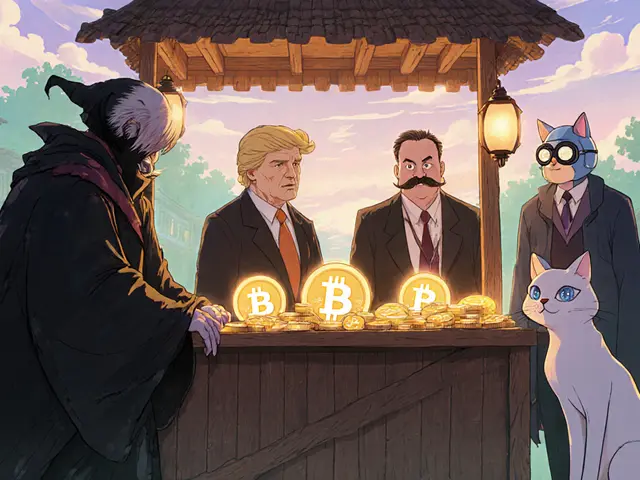17
Bank Account Freezing for Crypto Activity: 2025 Guide

Crypto Account Freeze Risk Checker
Check Your Crypto Transaction Risk
This tool simulates how regulators might evaluate your crypto transactions under current U.S. and EU frameworks. Enter details about your recent crypto activity to see potential risks.
Risk Assessment Results
Ever wondered why your bank suddenly blocks a transfer after you receive Bitcoin or a stablecoin? In 2025 the answer isn’t a glitch-it’s a wave of new rules that give banks the power to freeze accounts linked to crypto. This guide breaks down the why, the how, and what you can do to stay afloat.
Quick Take
- U.S. banks can now freeze crypto‑related funds under the GENIUS Act, a law passed in June 2025.
- Federal regulators require banks to run Know‑Your‑Transaction (KYT) checks on every blockchain address that touches a customer’s account.
- European Union enforcement follows the MiCA framework, which is slightly less aggressive but still demands heavy AML reporting.
- To avoid a freeze, keep detailed source‑of‑funds documentation and consider using crypto‑friendly neobanks with clearer compliance pathways.
- Future legislation (the CLARITY Act, CBDC Anti‑Surveillance State Act) will likely tighten the net even more.
Why Banks Are Freezing Accounts for Crypto
The surge in crypto adoption has attracted both legitimate investors and illicit actors. When the money‑laundering game gets tougher, banks react by protecting themselves from regulatory penalties. In 2025 the Anti‑Money Laundering (AML) and Combating the Financing of Terrorism (CFT) rules now explicitly extend to digital‑asset transactions. A single flagged address-say, one that’s ever appeared in a darknet market-can trigger a chain reaction that ends with a frozen checking account.
Bank executives are also responding to the GENIUS Act. The law defines a “lawful order” as any court or agency directive that requires a financial institution to seize, freeze, or block stablecoin movements. Because stablecoins are treated as “payment tokens” under the Act, banks must act on any order without waiting for a criminal conviction. The result: many banks now pre‑emptively block accounts that show any crypto exposure, even if the user has done nothing illegal.
2025 Regulatory Landscape
Two major policy shifts shape today’s environment:
- GENIUS Act (U.S.): Signed in June 2025, it creates a federal framework for stablecoins, mandates KYT monitoring, and gives regulators the authority to issue instant freeze orders. The Act also rescinded the FDIC’s restrictive FIL‑16‑2022 guidance, allowing banks to engage in “permissible” crypto activities-provided they have solid risk controls.
- MiCA (EU): The Markets in Crypto‑Assets regulation, fully enforceable since early 2025, requires EU banks to file detailed AML reports on crypto transactions and to maintain robust cryptographic key management for any custody services. While MiCA does not grant regulators the same direct freeze power as the GENIUS Act, non‑compliant banks face hefty fines and reputational damage.
Both regimes push institutions to adopt a “trust‑but‑verify” stance, using sophisticated blockchain analytics to trace funds across multiple hops.

How Enforcement Works on the Ground
Modern compliance teams rely on three technical pillars:
- Blockchain analysis platforms: Companies like Chainalysis and CipherTrace feed transaction data into the bank’s monitoring engine. The engine flags addresses linked to sanctioned entities, mixing services, or previously identified illicit wallets.
- Know‑Your‑Transaction (KYT) systems: Unlike KYC, which verifies the identity of the customer, KYT tracks the flow of crypto assets in real time. When a flagged address appears in a customer’s transaction history, the system can automatically place a hold on the linked fiat account.
- Third‑party risk management: If a bank outsources custody to a crypto‑custody provider, it must ensure that provider meets BSA/AML standards. Any breach on the provider’s side can cascade back to the bank’s customers.
Once an alert fires, the compliance officer reviews the case. If the risk level exceeds a preset threshold-often 80% confidence that the funds touch a high‑risk address-the officer can issue an immediate freeze pending further documentation.
What You Can Do to Avoid a Freeze
Preventing a freeze isn’t about hiding your crypto; it’s about proving the legitimacy of every inbound and outbound flow.
- Document source of funds: Keep purchase receipts, exchange statements, and wallet export files for any crypto you receive. A simple PDF folder can satisfy a bank’s “proof of source” request.
- Use reputable exchanges: Platforms that already comply with KYC/AML create a cleaner transaction history. Avoid peer‑to‑peer trades on obscure forums where addresses are more likely to be flagged.
- Separate personal and business wallets: If you run a crypto‑based business, open a dedicated corporate wallet and keep personal funds in a distinct account. This reduces crossover risk when a single address gets flagged.
- Consider crypto‑friendly banks: Some neobanks (e.g., Revolut, N26) have transparent compliance processes and publish their KYT criteria. Their lighter‑touch approach can lower the chance of an unexpected hold.
- Stay updated on legislation: New bills like the CLARITY Act are in the Senate pipeline. Knowing when a law passes helps you adjust your documentation strategy before a freeze hits.
US vs EU: A Side‑by‑Side Comparison
| Aspect | United States (GENIUS Act) | European Union (MiCA) |
|---|---|---|
| Legal basis for freezes | Lawful orders can compel immediate freeze of stablecoin‑linked assets. | Fines and enforcement actions, but no direct freeze order power. |
| Scope of assets | Stablecoins classified as payment tokens; other crypto covered under AML. | All crypto‑assets, including utility tokens, fall under MiCA reporting. |
| KYT requirement | Mandatory for any institution offering crypto‑related services. | Strong recommendation; implementation varies by member state. |
| Third‑party custody oversight | FDIC expects BSA/AML controls on custodial vendors. | Obligatory risk‑assessment and audit of custodians. |
| Penalties for non‑compliance | Criminal liability up to $5million per violation plus civil fines. | Fines up to €10million or 2% of annual turnover, whichever is higher. |
Future Outlook: What’s Next?
The regulatory tide isn’t receding. Analysts expect three trends to dominate the next two years:
- More granular KYT models: Machine‑learning tools will start scoring not just addresses but transaction patterns, making it harder for “clean” wallets to slip through.
- DeFi migration: As banks tighten, users may shift to decentralized exchanges that operate outside traditional financial supervision. This could create a parallel ecosystem with its own risk profile.
- Legislative cascade: The pending CBDC Anti‑Surveillance State Act aims to curb anonymous crypto use, potentially adding another layer of reporting for anything that can be tied back to a digital wallet.
For now, the safest bet is to treat every crypto transaction as a potential audit trigger. Keep records, use compliant services, and stay alert to policy shifts.

Frequently Asked Questions
Can a bank freeze my account if I only receive crypto from a friend?
Yes. Under the GENIUS Act, banks can freeze any account that shows a link to a flagged blockchain address, even if the crypto came from a personal transaction. Proof of source can lift the hold, but the freeze can happen automatically.
Do all U.S. banks freeze crypto‑related accounts?
Not all, but the majority of large banks have adopted the KYT framework required by the GENIUS Act. Smaller community banks may be slower, yet they still face the same legal pressure to act on freeze orders.
How does the EU’s MiCA differ from the U.S. approach?
MiCA focuses on transparency and reporting, imposing heavy fines for non‑compliance, but it does not grant regulators the direct authority to issue immediate freeze orders like the GENIUS Act does in the United States.
What documentation should I keep to avoid a freeze?
Save exchange trade confirmations, wallet address export files, bank statements showing fiat‑to‑crypto conversions, and any KYC paperwork from the platform you used. A tidy PDF folder can satisfy most bank requests.
Will DeFi platforms protect me from freezes?
DeFi operates outside traditional banks, so a freeze won’t hit your on‑chain assets directly. However, when you eventually move funds back to fiat, the same AML/KYT scrutiny applies, and you may still face bank holds.







Amie Wilensky
January 17, 2025 AT 16:43One might argue that the very notion of "bank account freezing" for crypto activity is not merely a legal instrument, but a philosophical mirror reflecting society's uneasy relationship with decentralised finance; indeed, the GENIUS Act, with its swift freeze powers, embodies a collective anxiety that transcends pure economics. It forces us to confront the paradox of liberty versus security, of anonymity versus transparency; each regulatory clause is a stanza in a larger poem about control. By demanding exhaustive source‑of‑fund documentation, regulators are essentially demanding the soul of a transaction, a demand that feels both invasive and protective. The very act of flagging an address-often based on algorithms trained on historical illicit patterns-raises questions about determinism, about whether a wallet is condemned by its past associations irrespective of current intent. Moreover, the EU's MiCA framework, while less draconian, still imposes a heavy compliance burden that could stifle innovation; it is a reminder that even liberal democracies will trade freedom for perceived stability. As users, we must navigate this tightrope, balancing our desire for privacy with the practical need to maintain unhindered access to fiat. In this dance, documentation becomes not just a bureaucratic step but a ritual of legitimacy. The rise of KYT systems, feeding real‑time alerts into compliance engines, is akin to installing an ever‑watchful sentinel at the gate of our financial lives. This sentinel, powered by firms like Chainalysis, can freeze assets with a click, turning a simple receipt into a potential courtroom drama. While some see this as an overreach, others view it as a necessary evolution in the age of digital assets-yet both perspectives share a common thread: the recognition that money, in its digital form, is no longer invisible. The future may hold even more granular models, dissecting transaction patterns with machine‑learning acuity that borders on clairvoyance. In such a world, the ordinary user must become a meticulous archivist, curating PDFs of exchange confirmations as if they were ancient scrolls. Ultimately, whether you side with libertarian caution or regulatory prudence, the current landscape forces a reevaluation of what it means to own and move value in a networked society.
MD Razu
January 27, 2025 AT 17:58From a broader perspective, the introduction of the GENIUS Act marks a decisive shift in how regulatory bodies perceive digital assets, treating them not as peripheral curiosities but as integral components of the financial system that demand comparable oversight; this shift is reflected in the mandatory Know‑Your‑Transaction (KYT) protocols now woven into every major banking operation. The act's provision for immediate freeze orders is a double‑edged sword: on one hand, it empowers institutions to act swiftly against potential money‑laundering schemes, thereby safeguarding the integrity of the monetary ecosystem; on the other hand, it introduces a quasi‑judicial capability that can be exercised without the traditional safeguards of due process, raising concerns about potential overreach. Consequently, banks are compelled to integrate sophisticated blockchain analytics into their compliance frameworks, partnering with firms that can parse the intricate web of transactions with high confidence levels. This integration, while technologically impressive, also heightens operational complexity, demanding that compliance officers possess both financial acumen and a deep understanding of cryptographic nuances. As a result, the cost of compliance is rising, often passed onto consumers in the form of higher fees or reduced service offerings. For everyday users, the practical implication is clear: any crypto‑related activity now demands rigorous documentation, from exchange receipts to wallet address export files, creating a bureaucratic overhead that can be daunting for newcomers. At the same time, the EU's MiCA regulation, though less aggressive in freeze powers, imposes its own set of stringent reporting obligations, emphasizing transparency over immediate enforcement. This regulatory dichotomy illustrates a global trend toward harmonising crypto oversight while allowing regional nuances to shape enforcement mechanisms. Looking forward, we can anticipate that future legislation, such as the proposed CLARITY Act, will further tighten the net, extending oversight to previously unregulated corners of the crypto universe. Therefore, maintaining a proactive approach-regularly updating compliance records, monitoring regulatory updates, and selecting reputable exchange platforms-remains the most effective strategy for individuals seeking to navigate this evolving landscape without triggering unnecessary freezes.
Charles Banks Jr.
February 6, 2025 AT 19:13Wow, banks are turning into crypto police now-guess my Bitcoin pizza is a crime scene. Guess I’ll stick to cash and pizza.
Ben Dwyer
February 16, 2025 AT 20:28Take a breath. Keep meticulous records and stay calm-you’ll get through any freeze faster than you think.
Lindsay Miller
February 26, 2025 AT 21:43It can feel scary, but remember you’re not alone. Small steps like saving PDFs of trades make a big difference.
Katrinka Scribner
March 8, 2025 AT 22:58Totally get the stress! 📁 Keep all those receipts in one folder, add a few emojis for fun 😂 and you’ll be golden.
VICKIE MALBRUE
March 19, 2025 AT 00:13Staying informed is the best defense.
Waynne Kilian
March 29, 2025 AT 01:28Honestly, the world is moving fast and the rules are chasing us. It’s okay to feel overwhelmed-it just means we’re on the right track of change.
Naomi Snelling
April 8, 2025 AT 03:43Wake up! Every freeze is just a test; the real agenda is to control every digital transaction before we even know it’s happening.
Michael Wilkinson
April 18, 2025 AT 04:58Enough of the fear‑mongering-if you keep solid records, the banks have no excuse to lock you out. Act now.
Billy Krzemien
April 28, 2025 AT 06:13Document everything-exchange PDFs, wallet exports, and transaction logs. A well‑organized folder is your best ally against compliance headaches.
april harper
May 8, 2025 AT 07:28The drama of a frozen account is tragic, yet the silence after the freeze can be even more haunting.
Clint Barnett
May 18, 2025 AT 08:43First, understand that compliance is not a static checklist but a living process that evolves with every new regulatory amendment; second, recognize that the GENIUS Act and MiCA are merely the latest chapters in a broader narrative about state oversight of digital value. Third, make a habit of weekly audits of your crypto holdings, ensuring every inbound transaction is paired with a source‑of‑fund document, whether that be a payroll stub, a sale receipt, or a mining reward ledger. Fourth, prioritize exchanges that are licensed and have robust KYC procedures; using unregulated platforms dramatically increases the odds of flagging. Fifth, consider diversifying your custody strategy-store long‑term holdings in hardware wallets while keeping active trading funds in regulated custodial accounts. Sixth, when selecting a bank, inquire about their KYT capabilities and ask for a transparent policy document outlining freeze procedures. Seventh, maintain a dedicated “Crypto Compliance” folder on a secure cloud service, updating it in real time as you make transactions. Eighth, tag each file with clear metadata: date, amount, counterparty, and purpose, so a quick search yields a complete picture. Ninth, stay abreast of legislative updates; set up Google Alerts for terms like “GENIUS Act,” “MiCA,” and “CLARITY Act” to catch changes before they become enforceable. Tenth, participate in community forums where professionals share best practices for documentation. Eleventh, when a freeze does occur, respond promptly with the requested documents; delays often exacerbate the situation. Twelfth, if a bank’s response seems unreasonable, consider escalating to the consumer financial protection bureau. Thirteenth, never underestimate the power of a well‑written, polite email-tone can influence an officer’s willingness to cooperate. Fourteenth, keep a record of all communications with your bank, noting dates, names, and outcomes. Finally, remember that vigilance is a habit; the more consistently you apply these practices, the less likely you’ll face disruptive freezes that hamper your financial freedom.
Jacob Anderson
May 28, 2025 AT 09:58Oh, great-another lawyer‑spam guide that tells us to keep receipts; because that’s never been done before, right?
Kate Nicholls
June 7, 2025 AT 11:13While the guidance is thorough, it’s essential to balance compliance with usability; too much paperwork can deter legitimate users.
Carl Robertson
June 17, 2025 AT 12:28Seriously, if you think a table of regulations will save you, you’ve missed the point: the real drama is watching banks scramble to interpret ambiguous clauses.
Rajini N
June 27, 2025 AT 13:43For anyone feeling lost, start with a simple checklist: 1) Export wallet addresses, 2) Save exchange statements, 3) Keep a log of fiat‑to‑crypto conversions. This practical approach keeps you compliant without drowning in paperwork.